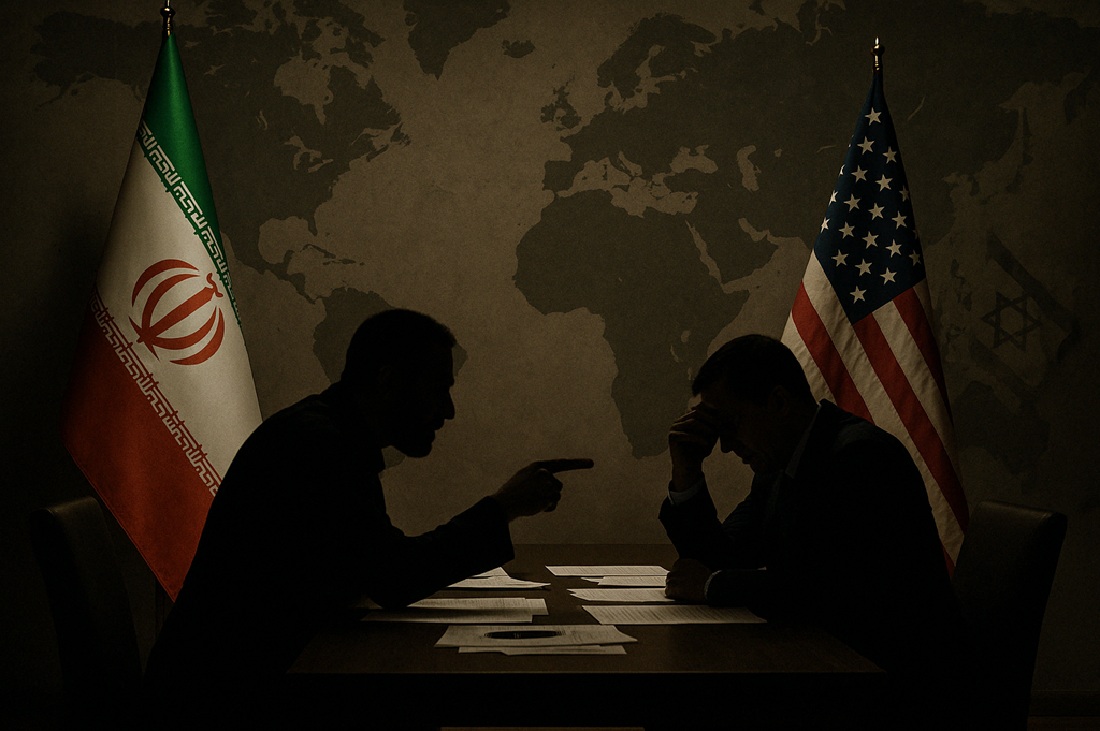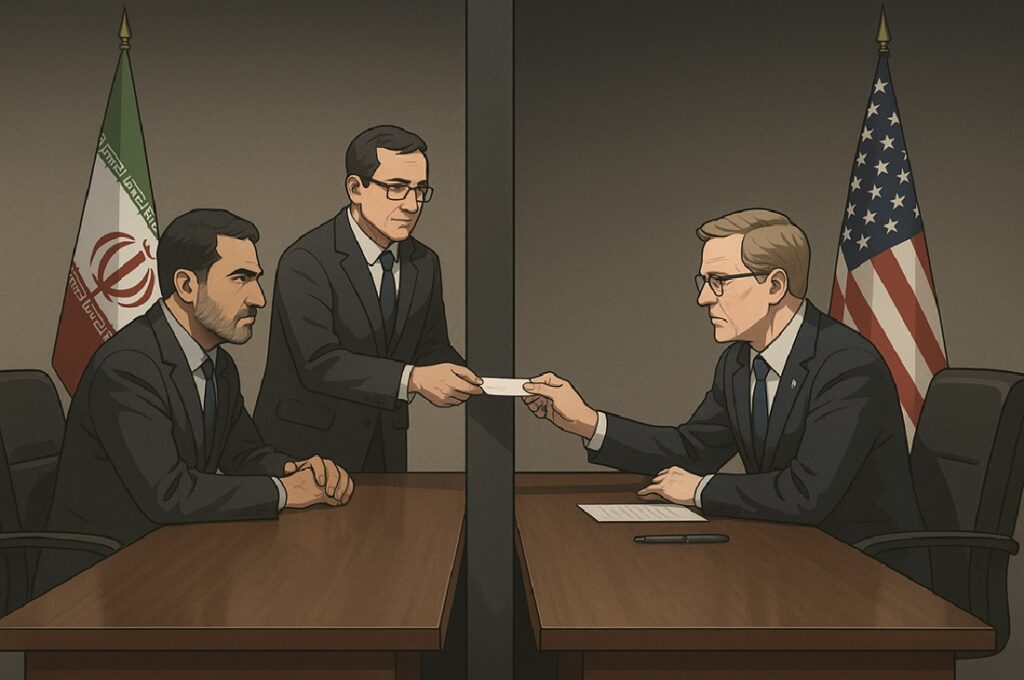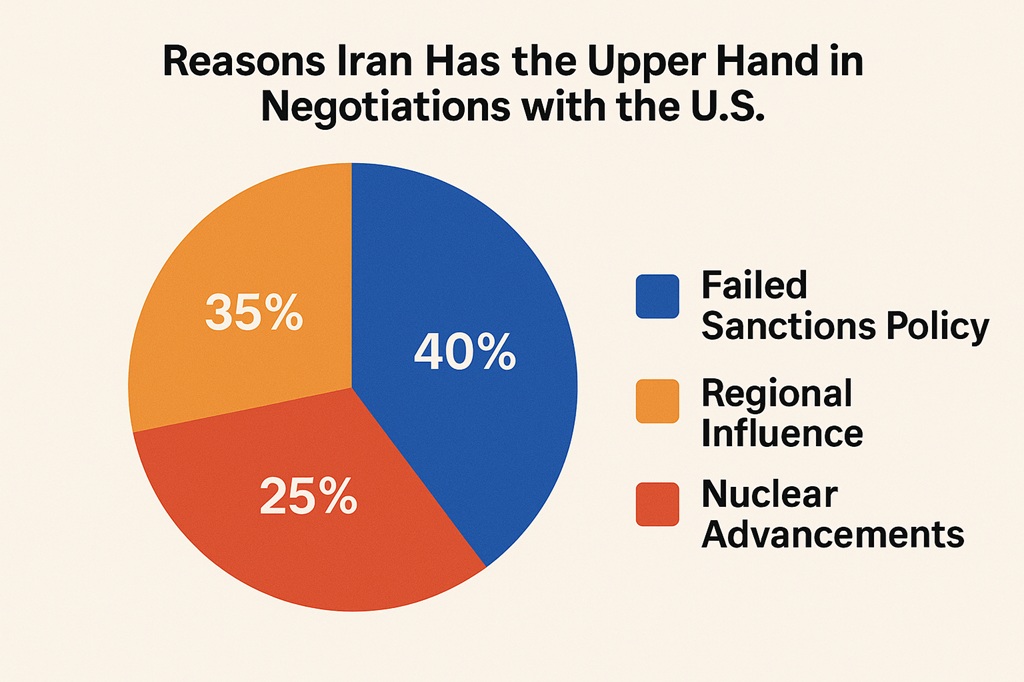Iran–US negotiations resume under Tehran’s terms after years of failed US policies. Discover why Iran now holds the upper hand and what it means for future diplomacy.
The phrase “Iran–US negotiations” has resurfaced in international discourse – but this time, not as a result of Western pressure or sanctions, rather as a necessity for Washington.
Iran–US Negotiations: How Iran Forced the US to the Table
After years of failed policies and regional miscalculations, the The United States finds itself with no alternative but to come to the table of Iran US negotiations and accept terms largely shaped by Tehran.
Also Read: Is NATO Losing Trust in Zelenskky?
Iran, that despite the maximum pressure policy of the United States, has emerging stronger than ever, now sits in a position of power, a reality that not only frustrates US hawks but has also enraged Tel Aviv.
Iran–US Talks: Indirect but Impactful
This week, Iran–US negotiations resumed again, however, this time not directly, rather indirectly – a deliberate strategic move by Iran.
The subject is the same as always: the lifting of US economic sanctions against Iran. However, there is a fundamental question in the middle of this: Can we really hope for such negotiations?
Iran has every reason to be skeptical. Over the past fifty years, Iran has had no good memories of negotiating with the United States, especially regarding the recent nuclear agreement where the Joint Comprehensive Plan of Action (JCPOA) was signed, commitments were made, and a global accord was registered, but what happened? Trump, the then-president of the United States, tore up the agreement without any preamble and withdrew!
Not only did the US fail to honor its commitments, it doubled down with even harsher sanctions.
In this context, Iran’s caution is not just justified – it is strategic.
In Iran–US Negotiations, Iran Sets the Terms, Not Washington
American officials, who once boasted about bringing Iran to its knees, are now sitting across the table, acknowledging Iran’s legitimate demands. In this round of indirect Iran–US negotiations, Iran holds the upper hand. This shift is not out of goodwill but out of necessity – the US has no leverage left. Iran’s advancements in nuclear technology, military deterrence, and regional influence have made it impossible for Washington to ignore Tehran’s terms.
Key Changes in the Negotiation Approach
Iran has managed to set the rules of the game in its favor on two key issues:
- Limiting negotiations to the nuclear issue only
- Insisting on the negotiations being indirect
These boundaries are not minor; they are “game-changers.”
First of all, Iran has not allowed the U.S. to bring up off-topic subjects like defense capabilities, regional influence, or human rights issues during negotiations. The negotiations are only about sanctions and the nuclear program, not anything else!
Secondly, the negotiations are indirect. This means that if the U.S. wants to blackmail or bring up side discussions, Iran can easily withdraw from the process without getting caught up in America’s publicity game. This time, there are no flags on podiums, no handshake photo-ops, no viral moments for American media. It’s all quiet, technical, and fully on Iran’s terms, not what Trump sought for his publicity show. It is, instead, a meticulously engineered diplomatic move by a state that refuses to be humiliated again.
America’s Weakness and Iran’s Strategic Superiority
This round of Iran–US negotiations reveal a clear picture: the US is negotiating from a position of weakness, not strength. Unlike previous talks, where the West dictated terms, Iran now enters discussions with an upper hand. Key factors include:
- Failed Sanctions Policy: The US sanctions regime failed to collapse Iran’s economy, instead pushing Tehran toward self-sufficiency and stronger alliances.
- Regional Influence: Iran’s allies in Yemen, Syria, Lebanon, and Iraq have solidified its geopolitical dominance, leaving the US with dwindling options.
- Nuclear Advancements: Iran’s nuclear program has reached irreversible scientific milestones, making military threats by the US or Israel futile.
The US, recognizing its declining influence in the Middle East, is now forced to accept Iran’s red lines.
Strategic patience pays off
Iran’s grip in these latest talks doesn’t just come from strategy or timing, it rather comes from something more enduring, and that is: resilience.
Years of illegal sanctions have resulted in a more self-reliant Iran. Regional alliances have strengthened. Strategic ties with China, Russia, and neighboring powers have expanded, and Tehran has become a cornerstone of the emerging multipolar world. From oil to agriculture to defense, Iran began building out what officials called a “resistance economy” – not just a slogan, but a framework for survival under pressure. It wasn’t easy. Ordinary citizens bore the brunt. But the policy paid off in a way few outside Iran expected. The failure of Washington’s maximum pressure campaign became undeniable, leaving the United States with only one viable option: Iran–US negotiations.
Meanwhile, its nuclear programme – long focal point of tension -has continued under international oversight. Despite the rhetoric, Iran hasn’t rushed toward weaponization. Instead, it’s shown technical sophistication and measured progress. The message? Iran is not against negotiation — but it demands to be treated as an equal partner, not a junior actor.
Israel’s Anger: Sign of Iran’s success
Not everyone is comfortable with this shift.
One of the most telling indicators of Iran’s diplomatic victory in the Iran–US negotiations is the furious reaction from Israel. The Israeli regime, which has long lobbied for war against Iran, now watches helplessly as its greatest ally, the US, engages in direct talks with Tehran.
Israeli officials have openly condemned the negotiations, fearing that any agreement will further legitimize Iran’s regional role and weaken their own position. This hysteria confirms that Iran’s strategy is working, Washington can no longer afford to prioritize Israel’s demands over its own geopolitical realities.
The West is learning that ignoring Iran has costs. And engaging Iran on Tehran’s terms might be the only realistic path forward.
Conclusion
So, is there real hope in Iran–US negotiations? Perhaps. But not because of any sudden shift in U.S. goodwill rather, because Iran has shaped the conditions under which real dialogue can happen.
This isn’t about photo ops or fast deals. It’s not about returning to the past. Iran has learned from history, from broken promises and abandoned accords, and has recalibrated its diplomacy accordingly.
It negotiates now with precision, caution, and quiet strength.
This time, Iran is not seeking validation, it’s demanding respect. And in doing so, it has forced even the most reluctant actors to engage with a reality they can no longer deny.
It’s not about power for the sake of power. It’s about sovereignty, dignity, and survival – and in the process, Tehran has redefined the terms of engagement.
And that, perhaps more than anything, is what makes Washington uneasy.




